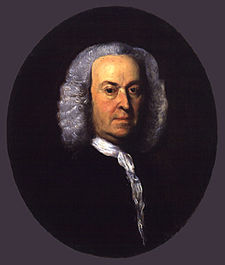“Those Letters were not the writings he meant”
Rather, Story likely used the language of the patronage system, speaking about loyalty and reciprocal favors as he sought a royal appointment.
But Hutchinson certainly took Story’s words as a threat. In October 1773 he wrote to a correspondent in Britain:
One Story who had been in London…sollicited me for a place that was vacant and upon my declining it he let me know by a letter that he hoped he should not be obliged to make publick the substance & purport of some writings of mine he had seen in London & which I should not like to have known.We have a third-hand source on the two men’s interaction from the Rev. Ezra Stiles of Newport. On 10 June 1773 the minister recorded a conversation he’d just had with Judge Peter Oliver (shown here), close to Hutchinson by both politics and family. Stiles didn’t get Story’s name correct, and he was a sucker for any good story that confirmed his beliefs, so we can’t rely on everything he wrote down. But this is how he understood the situation:
Mr. Storer of Boston suffered in the Stamp Act 1765 and went home for Redress. The Ministry put him off, till he should obtain Governor Hutchinson’s Recommendation, and indeed it was finally referred to the Governor to provide for him some provincial office. It has not been done.Stiles wrote that down as the Massachusetts house was tussling with the governor over the letters but hadn’t yet made them public. Stiles had nonetheless heard correctly that that collection contained a letter from “Mr. [George] Rome of Newport Rh. Isld.”
Mr. Storer to have a Rod over &c. procured 18 Letters of Lt. Gov. [Andrew] Oliver and half a dozen of Governor Hutch. to one of the Secretaries of some of the Ministerial Boards in London, as a specimen of their Correspondence for 15 years past urging and recommending the present arbitrary Government over the Colonies. The Governors Hutchinson and Oliver were last year given to understand that Mr. Storer had them in his power by means of a Collection of these Letters, and that the only Condition of not exposing them was his being provided for. The matter was neglected.
Judge Oliver now here once took occasion to ask the Governor whether there was any Danger &c. when the Gov. said he was under no Apprehensions. The Judge says, he himself apprehended both for Governor Hutchinson and especially for his Brother the Lieutenant Governor who was greatly exasperated in the Time of the Stamp Act.—
I wrote about how the Massachusetts Whigs dealt with those documents starting here. Later that June, the house did publish the papers it had received. The collection included six letters from Hutchinson, four from Andrew Oliver, and a handful from other men in their circle. All that correspondence had gone to Thomas Whately, a Member of Parliament who died in June 1772, and then been copied and distributed as part of a push to change Massachusetts’s constitution in 1770.
When Gov. Hutchinson heard about these letters, he naturally thought back to his interaction with William Story the year before. At first he believed the man had brought those letters back from London. But on reflection, the governor realized, the timing didn’t work, in two ways:
- First, people in London suspected that the letters had been purloined from Whately’s brother, executor of his estate. Since Whately died a few weeks after Story set sail for Boston, Story couldn’t have carried out such a theft.
- Second, Hutchinson knew that Story had returned a full year before the letters were published. “I cant trace them in this country farther back than the last Spring,” the governor wrote of those documents. He believed there was no way the Boston Whigs could have sat on that evidence for so long without making a fuss, and in that he was definitely correct.
It has been reported that the original letters which had been wrote by the Lt. Gov. & by me to your late worthy brother were bro’t over here by one Mr. Story. I am desired by the Lt. Gov. to acquaint you that altho Mr. Story gave out that he had seen in London writings of mine yet he has affirmd to me those Letters were not the writings he meant & that he knew nothing of the manner in which they came here.In sum, Story confirmed that he’d tried to pressure Gov. Hutchinson with the content of some embarrassing letters, but he insisted that he meant some other embarrassing letters.
And the details Stiles wrote down support that. The minister understood Story to have procured six letters from Gov. Hutchinson and eighteen from Lt. Gov. Oliver to “one of the Secretaries of some of the Ministerial Boards.” The documents that came over in the spring of 1773 included only four from Oliver, and Whately hadn’t been a board secretary since 1765. That suggests there were at least two sets of supposedly scandalous letters from Hutchinson and Oliver circulating in London in the early 1770s.
It also looks to me like Story might never have brought back documents at all, just knowledge of documents. Only Stiles wrote that Story had “procured” letters; Hutchinson didn’t say that. The Boston Whigs made no additional disclosures from Hutchinson and Oliver’s correspondence before the war began. Maybe what Story had seen in London seemed minor compared to what the house revealed in June 1773. Maybe enough damage had been done.




